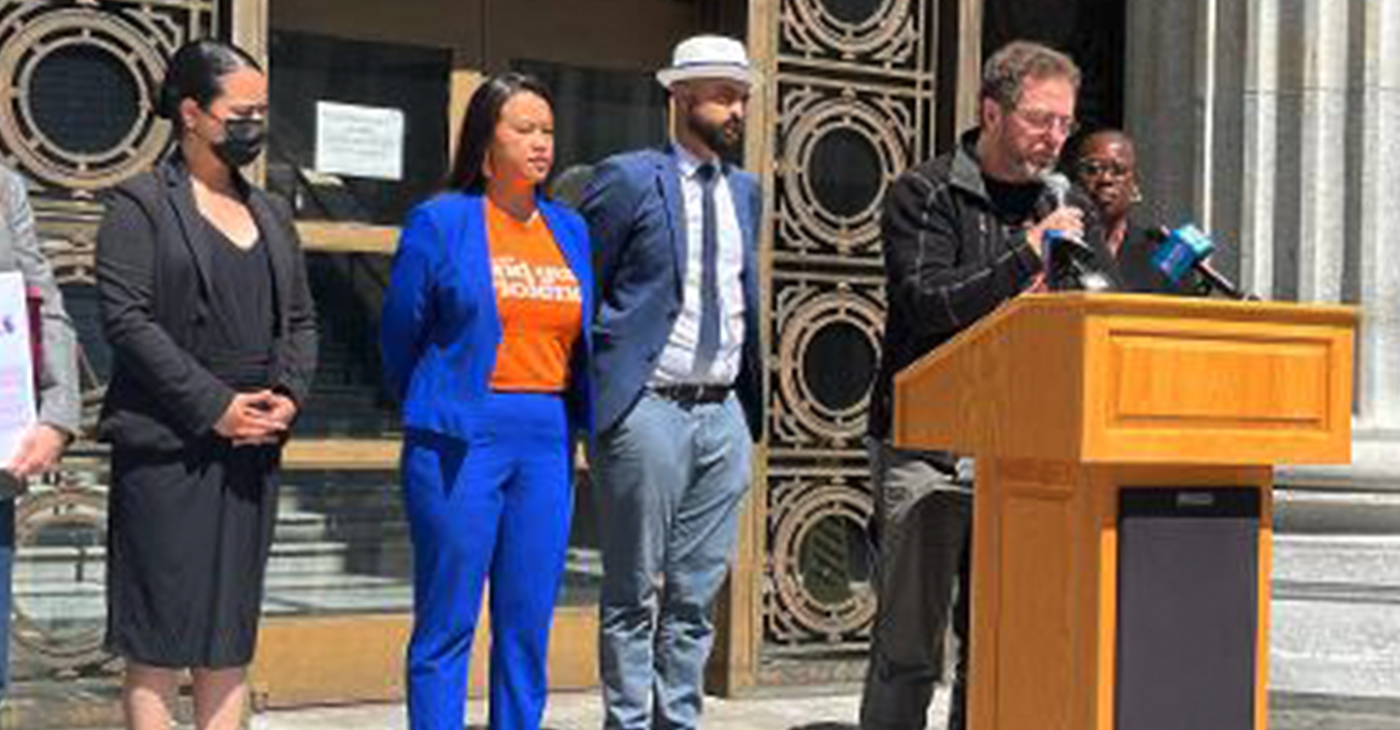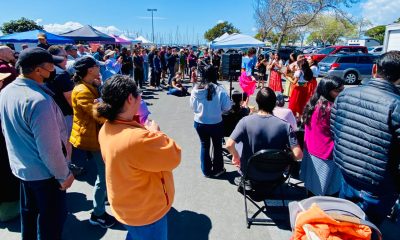Activism
City Council Calls for Investigation of Merger of Mills College with Northeastern University
Claudia L. Mercado, Mills alumnae and advisor of the Save Mills College Coalition, said, “This historic women’s college and Hispanic-serving Institution was intended to serve women’s education for generations to come, not traded on the open market for pennies.

By Ken Epstein
The Oakland City Council this week unanimously passed a resolution celebrating Mills College as the oldest women’s undergraduate college in the West and called for an investigation of the decision of Mills’ board and administration to merge the institution with Northeastern University – saying that the merger was “sudden and had very little transparency.”
At a press conference on City Hall steps, hosted by Council President Pro Tempore Sheng Thao and Vice Mayor Rebecca Kaplan, Mills’ alums and members of the Save Mills Coalition vowed to continue to continue pushing for an investigation of the deal even though it was finalized on June 30.
Said Kieran Turan, vice president of Save Mills College Coalition, “It’s deeply troubling how little oversight there is in California for non-profit small colleges, even those with the historic importance of Mills. (This council resolution) will help us take this issue up to the state and federal level. Mills College deserves justice. Women’s colleges are particularly at risk.”
Claudia L. Mercado, Mills alumnae and advisor of the Save Mills College Coalition, said, “This historic women’s college and Hispanic-serving Institution was intended to serve women’s education for generations to come, not traded on the open market for pennies.
“We must hold the Mills administration leadership accountable who were responsible for actively undermining a viable California higher-ed ecosystem and safe space for women, BIPOC and LGBTQ+ students. Bad higher-ed leaders should not be allowed to fail forward and monetize on the hardships of students and community members.”
In her remarks, Thao said, “As a Mills Alum, I was deeply troubled when the university declared it was closing after 170 years of service. With women and the LGBTQ+ community under attack across the country, it is incredibly important that institutions like Mills be preserved.”
“This merger was sudden, confusing, and done with very little transparency,” she continued. “Many faculty members (including tenured faculty) lost their jobs while students from around the world suddenly found out the programs they were in were cut. This process has been incredibly disruptive to the lives of thousands of people.”
In a prepared statement, Kaplan said, “Without warning or attempt to work with the student body, alumni groups or any other stakeholders, in March 2021, the Mills College Board and administration announced that the school was going to close because of financial hardship? All of a sudden? Without warning?”
She pointed out that Mills has “always been on the cutting edge of women’s rights (and) equality,” the first women’s college to offer a computer science major and the first women’s college to openly accept transgender students. Famous alumni include filmmaker Sofia Coppola, the late actress Olivia de Haviland and Oakland’s member of Congress Barbara Lee, she said.
Kaplan called for an investigation by the U.S. Department of Education and the California Bureau of Private and Post-Secondary Education.
“From the beginning, students and alumni have asked questions that haven’t been adequately answered. But the process continued, and the merger with Northeastern was proposed. Still, student and alumni questions were not answered.”
“But an independent investigation will bring everything into the light,” Kaplan said.
Activism
Oakland Post: Week of April 17 – 23, 2024
The printed Weekly Edition of the Oakland Post: Week of April 17 – 23, 2024

To enlarge your view of this issue, use the slider, magnifying glass icon or full page icon in the lower right corner of the browser window. ![]()
Activism
Oakland Schools Honor Fred Korematsu Day of Civil Liberties
Every Jan. 30, OUSD commemorates the legacy of Fred Korematsu, an Oakland native, a Castlemont High School graduate, and a national symbol of resistance, resilience, and justice. His defiant stand against racial injustice and his unwavering commitment to civil rights continue to inspire the local community and the nation. Tuesday was “Fred Korematsu Day of Civil Liberties and the Constitution” in the state of California and a growing number of states across the country.

By Post Staff
Every Jan. 30, OUSD commemorates the legacy of Fred Korematsu, an Oakland native, a Castlemont High School graduate, and a national symbol of resistance, resilience, and justice.
His defiant stand against racial injustice and his unwavering commitment to civil rights continue to inspire the local community and the nation. Tuesday was “Fred Korematsu Day of Civil Liberties and the Constitution” in the state of California and a growing number of states across the country.
One OUSD school is named in his honor: Fred T. Korematsu Discovery Academy (KDA) elementary in East Oakland.
Several years ago, founding KDA Principal Charles Wilson, in a video interview with anti-hate organization “Not In Our Town,” said, “We chose the name Fred Korematsu because we really felt like the attributes that he showed in his work are things that the children need to learn … that common people can stand up and make differences in a large number of people’s lives.”
Fred Korematsu was born in Oakland on Jan. 30, 1919. His parents ran a floral nursery business, and his upbringing in Oakland shaped his worldview. His belief in the importance of standing up for your rights and the rights of others, regardless of race or background, was the foundation for his activism against racial prejudice and for the rights of Japanese Americans during World War II.
At the start of the war, Korematsu was turned away from enlisting in the National Guard and the Coast Guard because of his race. He trained as a welder, working at the docks in Oakland, but was fired after the bombing of Pearl Harbor in 1941. Fear and prejudice led to federal Executive Order 9066, which forced more than 120,000 Japanese Americans out of their homes and neighborhoods and into remote internment camps.
The 23-year-old Korematsu resisted the order. He underwent cosmetic surgery and assumed a false identity, choosing freedom over unjust imprisonment. His later arrest and conviction sparked a legal battle that would challenge the foundation of civil liberties in America.
Korematsu’s fight culminated in the Supreme Court’s initial ruling against him in 1944. He spent years in a Utah internment camp with his family, followed by time living in Salt Lake City where he was dogged by racism.
In 1976, President Gerald Ford overturned Executive Order 9066. Seven years later, the 9th Circuit Court of Appeals in San Francisco vacated Korematsu’s conviction. He said in court, “I would like to see the government admit that they were wrong and do something about it so this will never happen again to any American citizen of any race, creed, or color.”
Korematsu’s dedication and determination established him as a national icon of civil rights and social justice. He advocated for justice with Rosa Parks. In 1998, President Bill Clinton gave him the Presidential Medal of Freedom saying, “In the long history of our country’s constant search for justice, some names of ordinary citizens stand for millions of souls … To that distinguished list, today we add the name of Fred Korematsu.”
After Sept. 11, 2001, Korematsu spoke out against hatred and discrimination, saying what happened to Japanese Americans should not happen to people of Middle Eastern descent.
Korematsu’s roots in Oakland and his education in OUSD are a source of great pride for the city, according to the school district. His most famous quote, which is on the Korematsu elementary school mural, is as relevant now as ever, “If you have the feeling that something is wrong, don’t be afraid to speak up.”
Activism
WOMEN IMPACTING THE CHURCH AND COMMUNITY
Juanita Matthews, better known as “Sister Teacher,” is a walking Bible scholar. She moved to California from the great state of Arkansas in 1971. Sister Teacher has a passion for teaching. She has been a member of Bible Fellowship Missionary Baptist Church since 1971.

Sister Juanita Matthews
55 Years with Oakland Public School District
The Teacher, Mother, Community Outreach Champion, And Child of God
Juanita Matthews, better known as “Sister Teacher,” is a walking Bible scholar. She moved to California from the great state of Arkansas in 1971. Sister Teacher has a passion for teaching. She has been a member of Bible Fellowship Missionary Baptist Church since 1971. She followed her passion for teaching, and in 1977 became the lead teacher for Adult Class #6. Her motto still today is “Once My Student, Always My Student”.
Beyond her remarkable love for the Lord, Sister Teacher has showcased her love for teaching by working for the Oakland Unified School District for 55 years, all but four of those years spent at Emerson Elementary and Child Development School. She truly cares about her students, making sure they have the tools/supplies needed to learn either at OUSD or Bible Fellowship Missionary Baptist Church.
She’s also had a “Clothes Closet Ministry” for 51 years, making sure her students have sufficient clothing for school. The Clothes Closet Ministry extends past her students, she has been clothing the community for over 50 years as well. She loves the Lord and is a servant on a mission. She is a loving mother to two beautiful children, Sandra and Andre. This is the impact this woman of God has on her church and the community.
-

 Activism4 weeks ago
Activism4 weeks agoOakland Post: Week of March 27 – April 2, 2024
-

 #NNPA BlackPress4 weeks ago
#NNPA BlackPress4 weeks agoCOMMENTARY: D.C. Crime Bill Fails to Address Root Causes of Violence and Incarceration
-

 #NNPA BlackPress4 weeks ago
#NNPA BlackPress4 weeks agoMayor, City Council President React to May 31 Closing of Birmingham-Southern College
-

 #NNPA BlackPress4 weeks ago
#NNPA BlackPress4 weeks agoBeloved Actor and Activist Louis Cameron Gossett Jr. Dies at 87
-

 Community1 week ago
Community1 week agoFinancial Assistance Bill for Descendants of Enslaved Persons to Help Them Purchase, Own, or Maintain a Home
-

 Activism3 weeks ago
Activism3 weeks agoOakland Post: Week of April 3 – 6, 2024
-

 Business1 week ago
Business1 week agoV.P. Kamala Harris: Americans With Criminal Records Will Soon Be Eligible for SBA Loans
-

 Activism2 weeks ago
Activism2 weeks agoOakland Post: Week of April 10 – 16, 2024


















































